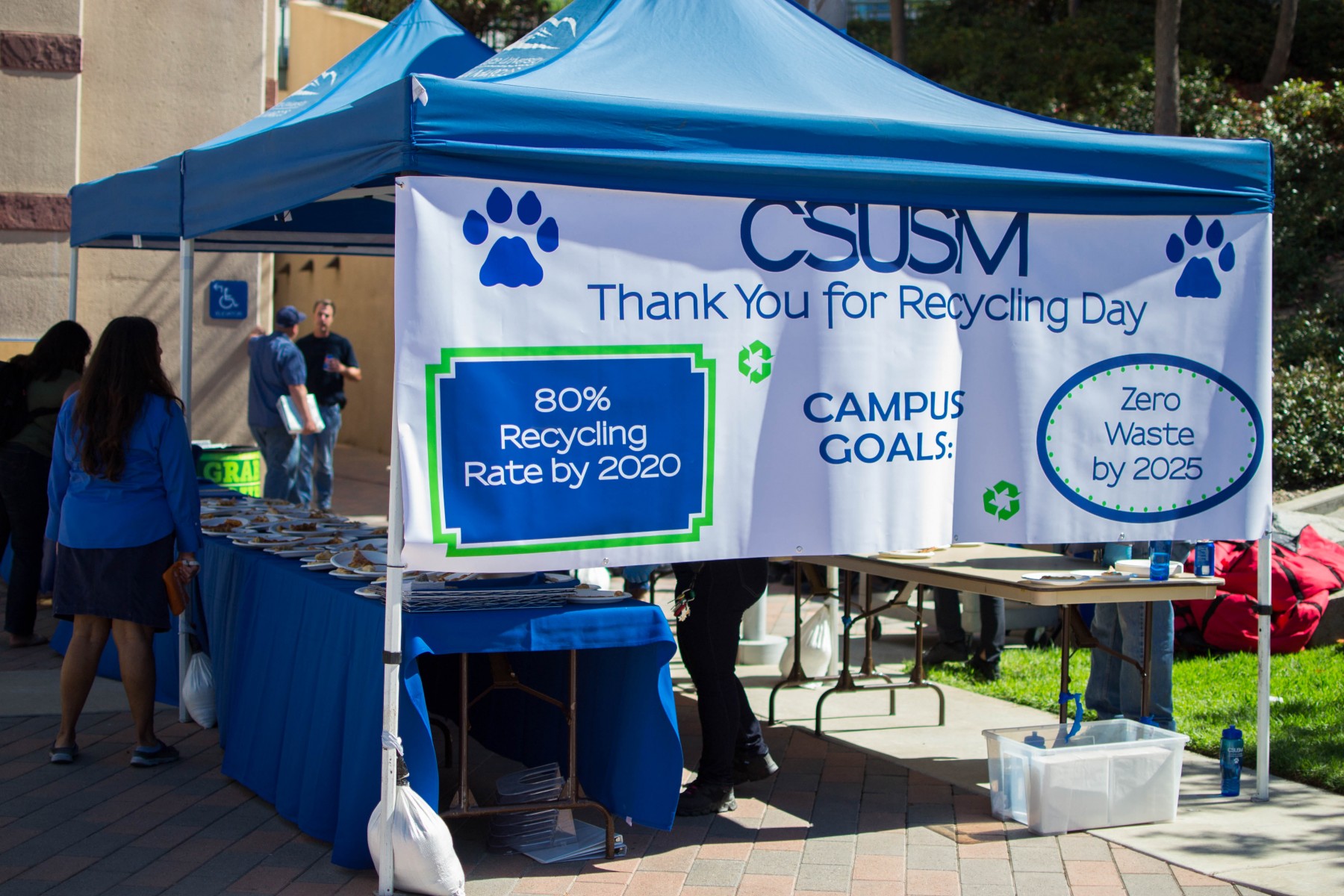On the Road to Becoming a Zero-Waste Campus
By Eric Breier
As Cal State San Marcos students moved out of the University Village Apartments in May, staff went through to remove any items left behind.
But they didn’t just throw those items into the trash.
Incoming UVA residents may want to thank staffers for their foresight when they arrive later this month. More than 300 pounds of kitchen items were recovered and will be made available at no cost for new residents this fall. Some 1,400 pounds of non-perishable food was donated to Cougar Pantry.
It's all part of CSUSM’s ongoing efforts to become a zero-waste campus by 2025.
“Recycling and waste management have been a priority at CSUSM since the campus was built,” said Juliana Goodlaw-Morris, the University’s sustainability manager in the Safety, Health and Sustainability department. “There were recycling bins with the trash bins from the time Craven Hall was opened – and that was not the norm back then. We’ve always had a culture of recycling on campus.”
Stephanie Hebert, the University’s recycling and sustainability coordinator in Energy Management and Utility Services, said normally those leftover kitchen items at UVA would have been donated to Goodwill. While more than 8,400 pounds of furniture was given to Goodwill, keeping the kitchenware and food on campus is part of the strategy to encourage the campus community to think more about sustainability.
CSUSM sends about 125,000 pounds of waste to the landfill each month during the fall and spring semesters. Up until November, a team of just 2½ people sorted through every piece of recycling that went into the bins located throughout campus. But toward the end of 2017 a much-anticipated state-of-the-art facility owned by EDCO, a local waste collection and recycling company, opened just a few miles from campus.
Hebert, who works closely with EDCO, said the new facility has not only allowed CSUSM to redeploy the employees who were sorting through the campus recycling, but the University has been able to keep the rebate money, which helps operate CSUSM’s zero waste program.
“We’re very fortunate to work with EDCO,” Goodlaw-Morris added. “They have been an amazing partner and share our goal of going to zero waste.”
In 2017, CSUSM had an average recycling rate of 78 percent. A pre-consumer compost program diverts about 700 pounds of food waste from the landfill each week.
Goodlaw-Morris anticipates adding post-consumer compost – items that someone may have eaten but not finished – once EDCO completes construction of a composting facility that is expected to open in late 2019 or early 2020. Once that occurs, CSUSM will move to a three-bin structure for compost, landfill and recycle.
One of the areas of opportunity for CSUSM is becoming more cognizant of what is being brought to campus. Goodlaw-Morris encourages people to consider three questions:
- What are you buying?
- Why are you buying it?
- What is the lifecycle of the product?
Since coming to CSUSM in 2015, Goodlaw-Morris has tried to ensure that items brought to campus are made from recycled materials whenever possible.
Single-use plastic bottles are the No. 1 item that is recycled on campus. As part of the University’s efforts to decrease the number of single-use plastic water bottles, more than 30 hydration stations have been installed throughout campus. And it has made a noticeable difference. Goodlaw-Morris said CSUSM has avoided using almost 3 million single-use water bottles as people are able to fill up reusable bottles in every building on campus.
David Wilson, a student assistant for Energy Management & Utility Services, noted that Hydro Flask bottles have become ubiquitous among students.
“It’s almost like a fashion statement,” said Wilson, a criminology and justice studies student who will graduate next spring.
Sandra Basave, the administrative support coordinator for Energy Management & Utility Services, is pursuing her MBA at CSUSM. She said many of her professors encourage sustainability, even asking students to submit work online rather than using paper – an important change considering 15-20 pounds of paper per person are recycled on campus each month.
“It’s really cool to see business professors say, ‘As a business student, you need to take note of this and make a conscious effort to make a difference now,’ ” Basave said. “Because if you pick up those good habits now, it will continue throughout your life.”
Hebert said one of her goals for the upcoming academic year is to help UVA improve its recycling numbers. Only 20-25 percent of the recyclable material at UVA actually gets recycled, and improving that number can help the campus get its overall recycling rate up near 90 percent.
“It’s not uncommon for us to hear, ‘I’m the only person in my dorm room who recycles,’ ” Hebert said. “I’m going to focus on increasing their recycling efforts and try to provide more education.”
Sustainability education is an ongoing challenge on college campuses because it’s a constantly changing population. Not only are new students arriving each year, but there’s also new faculty and staff. But Goodlaw-Morris remains optimistic that CSUSM will reach its zero-waste goal by 2025.
“It’s going to take small actions by everybody for us to get to zero waste,” Goodlaw-Morris said, “and ultimately make a difference not just on campus, but in the United States and around the world.”
Media Contact
Eric Breier, Public Affairs Specialist
ebreier@csusm.edu | Office: 760-750-7314




